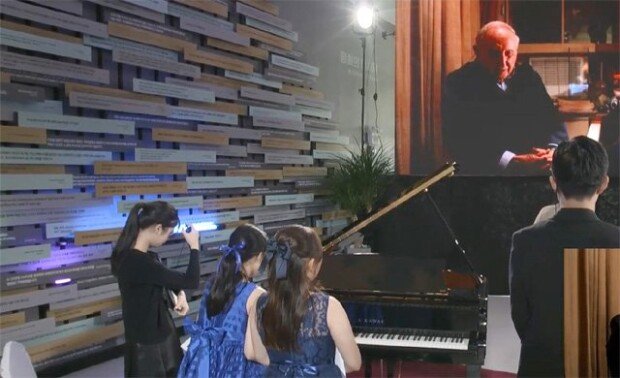Korean War-veteran piano master gives special lesson
Korean War-veteran piano master gives special lesson
Posted November. 10, 2020 07:38,
Updated November. 10, 2020 07:38

“I would like to pay tribute to those from all around the globe who lost their lives during the Korean War, their family and friends. Their blood and sweat have driven South Korea out of the suffering of the war and led it to achieve today’s level of development and improvement. It is my great honor to be given this opportunity given that I would be a soldier fighting in war.”
A piano arrangement of “Gottes Zeit ist die allerbeste Zeit (God's time is the very best)” was playing on a peaceful note in the video. It was Monday morning at Charles Smith Peace Hall of Osan Jukmiryeong Peace Park in Osan, Gyeonggi Province. An online master class was being given by world-class piano instructor Seymour Bernstein.
The master class was organized by Osan City with South Korean pianist An In-mo as emcee of the event connecting Bernstein’s house in New York and Charles Smith Peace Hall. Four promising pianists including Kim Kyung-seok, a senior at Seoul Arts High School, and Lee Woo-rim, a third grader at Wonil Elementary School in Osan, performed and received feedback from Bernstein.
Joining the U.S. army at the age of 23, Bernstein was sent to South Korea in April 1951 during the Korean War. He toured frontline military camps across Paju, Yeoncheon, and other regions to perform for more than a hundred times for one and a half years. An opening video clip to the class showed him having an interview home. Opening up an old diary, he recalled, "The gates of hell opened while I was performing ‘Ave Maria’ on Aug. 26 1951. The piano sound resonated just like waves against the backdrop to high-angle guns being fired everywhere.”
Since retiring from stage performance in 1977, Bernstein has had great influence on piano education by teaching students in New York University and publishing must-read books for performers such as “Chopin: Interpreting His Notational Symbols.” The seasoned pianist performed under the spotlights at the age of 87 in “Seymour: An Introduction,” a documentary film in 2014 directed by Ethan Hawke, the main actor of “Before Sunrise.”
"Don’t call me Sir. Call me Seymour,” he said in the opening part of the master class. Listening to the four young students’ playing, he gave them a two-hour lesson on the basics of piano touch and feel techniques, dynamics, tempos, and legato pedaling. With the master class and a tribute performance finished, Bernstein advised the prospective pianists, “First of all, learn notes and understand them with your emotions and feelings. Then, you should get your body used to it.”
“Turning 90, I spend a lot of time thinking of what I can leave when I die. I ask around to find an answer but I fail. My conclusion is that what matters most in life is to make contributions to something. What I can contribute to is helping young musicians with a sense of pride.”
gustav@donga.com
Headline News
- Joint investigation headquarters asks Yoon to appear at the investigation office
- KDIC colonel: Cable ties and hoods to control NEC staff were prepared
- Results of real estate development diverged by accessibility to Gangnam
- New budget proposal reflecting Trump’s demand rejected
- Son Heung-min scores winning corner kick







